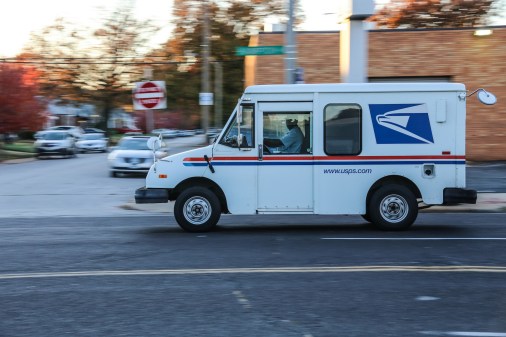USPS unveils 5 potential smart city projects

Against the rise of email, chat and the quick pace of the internet, the U.S. Postal Service is trying to reinvent itself and stay relevant in the digital age.
In a Sept. 26 report from USPS Office of Inspector General, the mail carrier unveiled five smart city pilot projects. They include a pothole detection network, sensors that detect the structural safety of bridges, air quality monitoring, notifications for leaking pipes and blight tracking.
These experiments are a way for USPS to investigate alternative uses for its vast fleet of carrier vehicles and facilities, that while still necessary, have seen a dramatic declines in usage. This decline contributes decline in annual operating revenues, including an overall budget drop from $72.7 billion in 2006 to $68.8 billion in 2015.
Even so, the ambition is for USPS to evolve into a smart city provider, one that might one day draw fresh dollars from cities, states, or federal agencies who wish to leverage USPS’ suite of innovative technologies and vast logistical resources. The organization boasts more than 211,000 delivery vehicles, covers 152.9 million delivery spots, has 172,000 collection boxes and 35,000-plus retail facilities. All of these might be repurposed to aid cities who can’t always afford smart city and Internet of Things infrastructure costs.
“The U.S. Postal Service, with its ubiquitous physical network, could provide cities with an unparalleled means to collect the data that can be used for smart city initiatives,” the USPS report reads.
A look into the projects shows the pilots, if green-lighted, will use USPS fleets and touch seven different cities.
In Pittsburgh, a city slated for two of the projects, officials seek to identify cracks in the roads before they become costly potholes. To do this, USPS is collaborating with researchers at Carnegie Mellon University that have created software to detect surface cracks and potholes via a video camera mounted to the windshield. Data is uploaded to the cloud once a vehicle nears a Wi-Fi hotspot.
Pittsburgh is coupling this project with another meant to sense vibration in bridges. While not easily visible, the issue of bridge safety is sizable problem in the U.S. and the American Society of Civil Engineers have classified more than 65,000 bridges across the U.S. as “structurally deficient.” With support from Carnegie Mellon, the USPS would equip vehicles with accelerometers, devices that would read vibration levels in the city’s bridges and report deficiencies to inspectors.
A third project, in Maryland, is all about curtailing water waste. In partnership with the Innovation Office of Montgomery County, Md., the USPS has proposed a beacon and relay system that would affix moisture sensors to water pipes in the ground to communicate leaks to county utility services. Each time a carrier vehicle passes within about 30 yards of a sensor, the data alerts would be transmitted, then relayed through the delivery truck to utility managers.
“Any abnormality would create an automatic alert so that repairs could be made quickly,” the report reads.
For the New York cities of Schenectady, Troy, Gloversville and Amsterdam, USPS is working on a blight tracking system that leverages both analytics and delivery staff. The idea is to turn mail delivery workers into impromptu code inspectors by giving them a mobile app that could note disrepair in homes.
The last project, based in Portland, Ore., will place air quality sensors in the USPS vehicles to sketch a map of air conditions with geotagged data. Portland has already invested $100,000 in two monitoring stations that detect pollutants along a 12-mile corridor and this project would further expand its coverage.
Jason Shueh is the tech editor of StateScoop.






